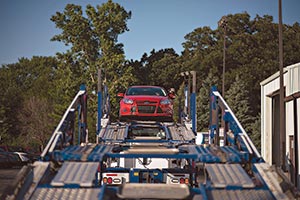Car Haulers Expect ‘Stellar’ 2015 Market, Driven by Robust Vehicle Sales, Economy

This story appears in the Jan. 19 print edition of Transport Topics.
Car haulers, buoyed by 2014 new vehicle sales at an eight-year high, remain optimistic that their industry’s rebound will continue this year amid further improvement in the economy.
Three fleets serving the new vehicle market as well as the executive director of American Trucking Associations’ Automobile Carriers Conference told Transport Topics last week that 2014 was a banner year.
A total of 16.5 million new cars and light trucks was sold last year, 6% better than 2013, and the strongest year since 2006.
“The market has been stellar,” said Kirk Williams, CEO of Proficient Auto Transport, a Jacksonville, Florida-based carrier with 120 trucks.
Top executives at Jack Cooper Holdings, the largest car hauler, and second-largest United Road Services, agreed.
“2014 was a record year for us,” Mike Riggs, chairman of Jack Cooper, which ranks No. 37 on Transport Topics Top 100 list of for-hire carriers in the United States and Canada.
Part of the reason, he said, was the addition of business, drivers and equipment when his company completed the acquisition of Allied Holdings, another car hauler, in January of last year.
“2014 was a very, very solid year for United Road,” CEO Kathleen McCann said. “Volumes are up across all segments.”
The carrier, which offers new vehicle as well as used and specialty services, expanded its customer base, captured new business opportunities and increased both its driver and truck count, she said.
“We grew in line with the market on the new car side, and in excess of the market on the re-marketing and specialty business,” McCann added.
Like Jack Cooper, No. 74 United Road was helped by an acquisition absorbed in 2014. United Road bought Waggoners, a Montana-based car hauling business.
All four industry officials said the favorable 2014 trend is expected to continue this year.
“It appears it’s going to be a pretty strong year,” Williams said, as the average vehicle age remains at 11 years and interest rates are low. “It’s going to be equal to if not stronger than 2014.”
“We expect 2015 to be very strong as well,” McCann said, including higher used car sales.
“Keeping up with market demand is a good problem to have,” she said.
Robert Farrell, executive director of the ATA conference, added growth will be affected by broader economic trends and interest rates.
He said “the industry is doing well.”
Farrell also cited a familiar theme that was echoed by the carriers.
“The number one issue for them is warm bodies in the truck,” he told TT on Jan. 12. “It’s getting harder to find qualified drivers.”
Williams explained one reason for the particular difficulty car haulers face: “We’re a niche within a niche” of the driver market, because car haul drivers require a variety of additional skills that dry van operators don’t have. Drivers have to learn how to operate specialized hydraulics and engineering, he explained.
Because those skills are necessary, Williams added that car-haul drivers can switch to van operation opportunities in an environment where wages are rising.
“But it doesn’t work the other way around,” he noted.
McCann agreed, saying drivers have to have customer-service skills as well as be athletic enough to unload as much as $350,000 worth of new vehicles safely.
McCann cited two other reasons why driver issues persist.
One is “poaching,” as car haul companies go after each other’s drivers when they need more capacity. Some drivers also have left for higher-paying oil field jobs, she added.
Riggs said Cooper hasn’t had a turnover problem because drivers continue to seek out its union jobs at a stable company with 83 years in business.
Vehicle makers also continue to be concerned about rail service levels that have persisted, Farrell said.
Wade Newton, a spokesman for the Alliance of Automobile Manufacturers, said the trade group would continue to urge the Surface Transportation Board to monitor rail service.
“The rail network serving finished-vehicle transportation was severely stressed in 2014,” Jodi Tinson, a spokeswoman for Fiat Chrysler Automobiles, said on Jan. 15. “Additional investments in equipment and infrastructure, as well as the hiring of more rail crews, is anticipated to yield results in 2015.”
McCann and Williams said manufacturers are continuing to seek bids for longer truck hauls in the face of rail delays.
One long-term market share indicator is the fact that rail vehicle shipments last year were nearly 20% lower than 2006, when sales barely exceeded 2014, based on Association of American Railroads statistics.

